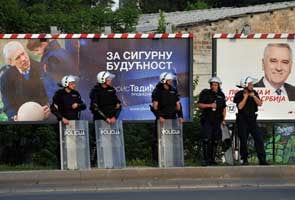
Belgrade:
Serbians will vote on Sunday in presidential, parliamentary and local elections, with a choice between the pro-European camp of President Boris Tadic and populist rival Tomislav Nikolic.
For more than 6.7 million voters, these are the first elections in decades to focus on economic issues rather than the Balkans conflicts that left Serbia internationally isolated in the 1990s and the first decade of the 21st century.
The latest opinion polls put Mr Tadic's Democratic party (DS) and Mr Nikolic's Serbian Progressive Party (SNS) neck-to-neck in the elections for the 250-seat one-chamber parliament, suggesting each would win up to 30 per cent of the vote.
But neither camp was expected to win enough votes to form a government on its own. Analysts believe that the Socialists will end up playing the role of the kingmakers in the next parliament.
Mr Tadic and Mr Nikolic are also the front runners among the 12 candidates for a five-year presidential mandate.
Surveys show Mr Tadic and Mr Nikolic would face each other in a second round, with analysts expecting the 54-year-old incumbent Mr Tadic to triumph, as he has done twice before.
Mr Tadic has led Serbia from being an international pariah state to EU candidacy status in March.
He has insisted the vote is "crucial for the next 10 years in Serbia...in terms of the economy, foreign policy and the challenges Serbia must face."
The country's economic outlook looks grim, with gross domestic product growing in 2011 by just 1.6 per cent and expected to flatten this year.
And economists predict that unemployment, already at a record 24 per cent, will rise further.
Mr Nikolic had vowed to attract foreign investment from countries outside the EU, indicating plans to strengthen ties with Serbia's traditional ally Russia.
The 60-year-old former ultra-nationalist acknowledged that European Union membership would be useful to the country.
But he stressed that Serbia "can only join the EU with Kosovo", meaning that Belgrade would not give up its claim to the southern territory.
Kosovo declared independence from Serbia in 2008 and has been recognised by 90 countries, including the United States and all but five members of the European Union.
The Organisation for Security and Cooperation in Europe (OSCE) mission will organise the elections for some 109,000 Serb voters living in Kosovo.
Polling stations open at 7:00 am (0500 GMT) and close at 8:00 pm. The first significant partial results are expected after 9:30 pm.
For more than 6.7 million voters, these are the first elections in decades to focus on economic issues rather than the Balkans conflicts that left Serbia internationally isolated in the 1990s and the first decade of the 21st century.
The latest opinion polls put Mr Tadic's Democratic party (DS) and Mr Nikolic's Serbian Progressive Party (SNS) neck-to-neck in the elections for the 250-seat one-chamber parliament, suggesting each would win up to 30 per cent of the vote.
But neither camp was expected to win enough votes to form a government on its own. Analysts believe that the Socialists will end up playing the role of the kingmakers in the next parliament.
Mr Tadic and Mr Nikolic are also the front runners among the 12 candidates for a five-year presidential mandate.
Surveys show Mr Tadic and Mr Nikolic would face each other in a second round, with analysts expecting the 54-year-old incumbent Mr Tadic to triumph, as he has done twice before.
Mr Tadic has led Serbia from being an international pariah state to EU candidacy status in March.
He has insisted the vote is "crucial for the next 10 years in Serbia...in terms of the economy, foreign policy and the challenges Serbia must face."
The country's economic outlook looks grim, with gross domestic product growing in 2011 by just 1.6 per cent and expected to flatten this year.
And economists predict that unemployment, already at a record 24 per cent, will rise further.
Mr Nikolic had vowed to attract foreign investment from countries outside the EU, indicating plans to strengthen ties with Serbia's traditional ally Russia.
The 60-year-old former ultra-nationalist acknowledged that European Union membership would be useful to the country.
But he stressed that Serbia "can only join the EU with Kosovo", meaning that Belgrade would not give up its claim to the southern territory.
Kosovo declared independence from Serbia in 2008 and has been recognised by 90 countries, including the United States and all but five members of the European Union.
The Organisation for Security and Cooperation in Europe (OSCE) mission will organise the elections for some 109,000 Serb voters living in Kosovo.
Polling stations open at 7:00 am (0500 GMT) and close at 8:00 pm. The first significant partial results are expected after 9:30 pm.
Track Latest News Live on NDTV.com and get news updates from India and around the world

